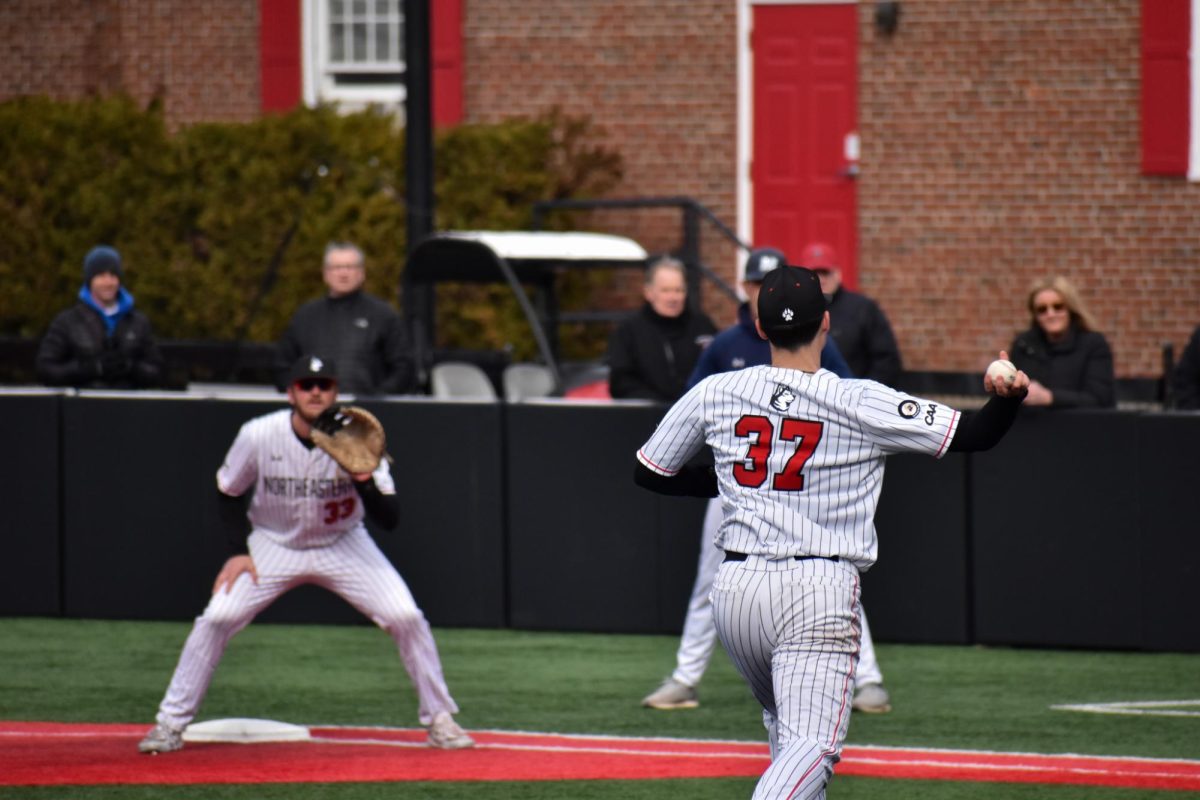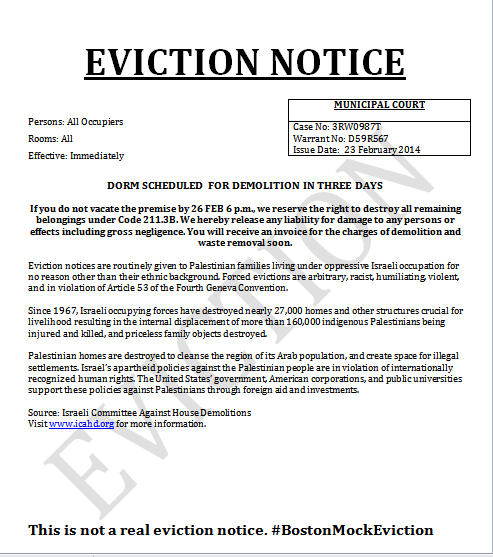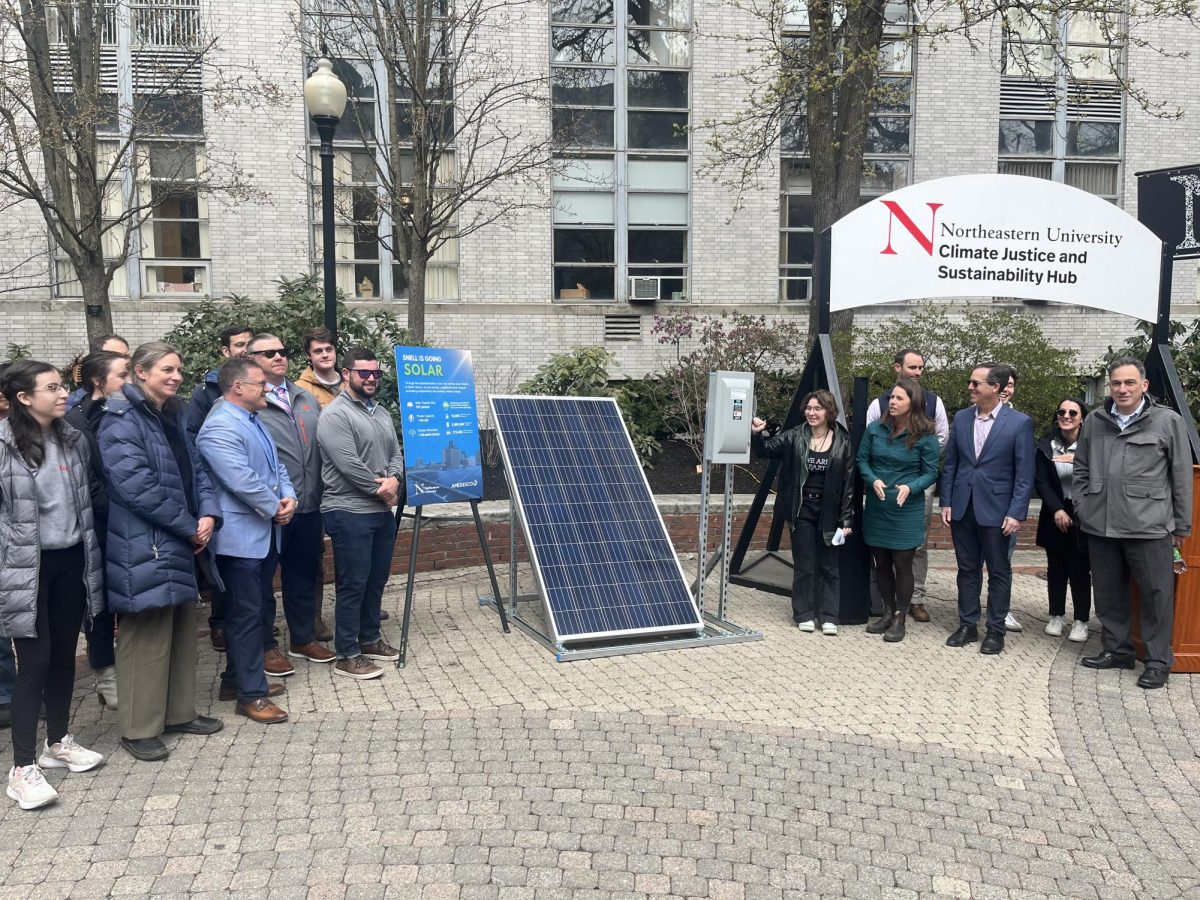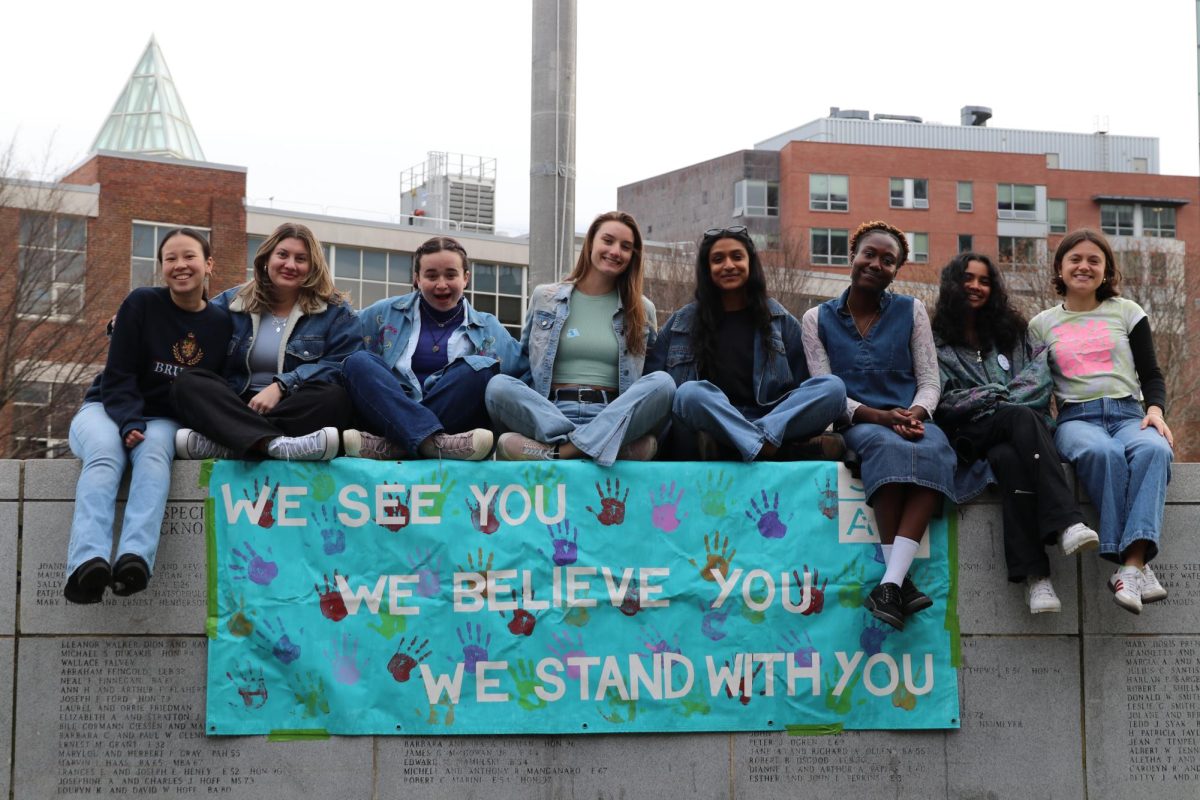By Miharu Sugie, News Staff

In some Northeastern residence halls, fake eviction notices were slipped under the doors of unsuspecting students’ rooms, in late February. Each notice bore bolded words like “demolition,” a concept foreign to many students but one that drives fear into many Palestinian families. Students for Justice in Palestine (SJP), a Northeastern student-run organization, distributed these flyers marked with “#BostonMockEviction” to bring this reality to students.
As a result of the action, SJP was suspended until December on March 7 by the Northeastern administration for repeated “disregard for university policies over an extended period of time,” according to a statement from the university sent to The News yesterday. The administration specified several violations: “vandalism of university property, distribution of flyers in residence halls without prior approval and disrupting the events of other student groups.” These policies, according to the administration, can be found in the Student Organization Resource Guide.
Dima Khalidi, director of Palestine Solidarity Legal Support and legal advisor to to SJP since last spring, when the administration put SJP on probation, said that two female members are being investigated by the Northeastern University Public Safety Division (NUPD) in addition to the suspension. They were summonsed to the Office of Student Conduct and Conflict Resolution (OSCCR), according to Khalidi.
“Many SJP members feel as though they’ve committed a crime and I’d like to sort of make clear that we have not had hearings to answer these charges about distributing flyers,” said Max Geller, president of SJP and a third-year law student.
In response, members of SJP have started a petition via change.org against Northeastern to release SJP from suspension and drop all charges against the organization’s members.
Soon after SJP’s suspension, Northeastern associate dean of Cultural, Residential and Spiritual Life Robert O. Jose sent an email to students stating that the university does not condone disruptive behavior that threatens or targets members of the Northeastern community.
“The issue here is not one of free speech or the exchange of disparate ideas,” the university’s statement to The News said. “Instead, it is about holding every member of our community to the same standards, and addressing SJP’s non-compliance with longstanding policies to which all student organizations at Northeastern are required to adhere.”
However, Geller said he thinks the issue is less about a violation of policies and more of a scrutiny of the content of the eviction notices. He said that many organizations seem to post flyers without proper authorization; he noted that students on campus walk by hundreds of leaflets and unauthorized posters on glass windows, which can potentially be a fire hazard, everyday.
“I see those every day, and you see those everyday, every student sees those everyday,” Geller said. “The fact that Northeastern SJP is being charged as a group for what the university calls the acts of individuals, in fact we’re being charged as a group, for putting up flyers, a thing that everyone does all the time, it has more to do with our content then the act of flyering. It’s the content of those flyers that the university is really responding to and that’s an upsetting notion. That is a real problem for those of us who take academic freedom and free speech seriously.”
“SJP as a group is being treated differently and are viewed with a lot more scrutiny because of what we think is their message,” Khalidi said. “This differential treatment is the problem here.”
National Lawyers Guild (NLG) and NLG Palestine Subcommittee member Barbara Harvey added that pro-Palestine groups tend to be scrutinized more because many accuse them of anti-Semitism, discrimination and harassment.
“This is a worrying trend we see not just at Northeastern,” Khalidi said.
Many universities’ administrations have been targeting specific activism because of the reaction by groups that strongly support Israel and private universities have more flexibility enforcing policies, compared to public schools because public schools are bound by the constitution, Khalidi said.
Although Khalidi said there have been many instances of such scrutiny of pro-Palestine groups, the Department of Education (DOE) recently declared in August 2013 that student activism criticizing Israel’s state policies and supporting Palestine was in fact not anti-Semitic harassment. This decision to dismiss complaints of anti-semitic harassment at the University of California at Berkeley protects the sort of freedom of speech that Geller said the SJP and other student organizations should have.
“It’s not anti-semitic to express criticism against a nation-state’s official state policy,” Harvey said. “You have to use an objective standard and someone’s feelings being hurt is not an objective standard. It’s subjective standard.”
Northeastern Hillel executive director Arinne Braverman wrote on the Huskies For Israel’s Facebook page about the incident: “The mock eviction notice is a publicity stunt that has been used at other college campuses in the past. It includes factually inaccurate content about Israel and is part of a campaign of intimidation and fear used to manipulate public opinion against Israel.” On Facebook, Braverman encouraged anyone with concerns to contact her and other officers of Hillel. She declined to comment further.
Less than a day after Jose’s email reached the Northeastern community, SJP had already gathered approximately 3,300 signatures. People in other states and abroad have signed the petition.
“I am very disappointed at the obvious abuse of censorship that is being used to silence the conflict rather than flesh it out and present an opportunity for both pro-Israel and pro-Palestinian members of the respective student groups to voice their opinions,” Ibis Valdes, a political science and international affairs major who signed the petition, said.
Harvey said that private universities like Northeastern are not bound by the First Amendment. To threaten students based on the content of their speech is “contrary to providing a healthy, vibrant environment.” Harvey calls this “content-based discrimination.”
“I can’t say whether everything they do or say is correct or put the best way, but [organizations like SJP] are an outlet of expression that must exist in human society,” Anthony Phillips, a second-year history major who also signed the petition, said. “Struggling people simply have to be heard. If we didn’t have SJP or groups that are willing to take a stand, debate and promote their opinion and the spirit which compels people to do this, protest and speak out, then there wouldn’t be a Northeastern, there wouldn’t be a Boston as we know it.”
In the past, Geller said, SJP has attempted to reach out to the university’s general counsel, Ralph C. Martin II, and President Joseph E. Aoun with much difficulty, but Geller said that SJP welcomes any opportunity to speak with the administration.
“Being a part of the Northeastern community is really important to us and being told as an organization that we’re no longer welcome hurts our feelings and is disappointing,” Geller said. “It doesn’t have to be this way.”














